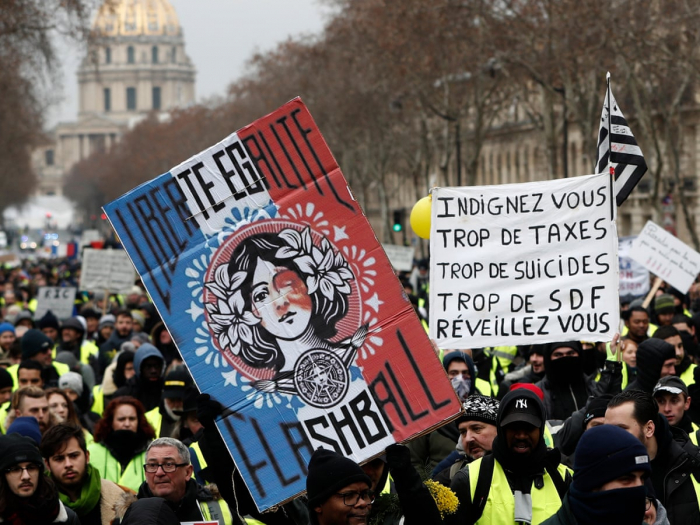Too much repetition can diminish the impact of even the most dramatic events. Such is the case with mass protests in France, which erupt so often and persist for so long that much of the world hardly takes notice. But the current bout of protests – which culminated in violent clashes with police on May 1 – warrants reflection about French society’s political alienation and what can be done about it.
Coming three years after the last major protests – an unusually long period of docility for France, brought about by the pandemic – the current wave of demonstrations was triggered by President Emmanuel Macron’s push to enact pension reform. Peaceful marches, millions-strong, were sustained for weeks, but to no avail: in March, Macron’s government raised the retirement age by decree, invoking Article 49.3 of the constitution to bypass the National Assembly.
Now, the protests have taken a violent turn. The May Day protesters clashed with police, leaving more than 100 officers injured and resulting in nearly 300 arrests. The extent to which this escalation can be blamed on Macron’s decision to bypass the legislature is impossible to say. But there is no doubt that many citizens viewed it as a slap in the face by a president who, following last year’s elections, no longer has the support of a parliamentary majority.
In fact, the move transformed France’s domestic political debate. Instead of weighing the advantages and disadvantages of a higher retirement age, people began asking simply: Who governs France?
But the trite framing of that question as a choice between the democratically elected government and the protesters obscures a more interesting issue. If the government’s actions are entirely legal, but its legitimacy is fraying nonetheless, is France’s political-constitutional system fundamentally flawed? Assuming that it is, how can we lay the groundwork for repairing the relationship between government and the people?
At the heart of the Fifth Republic, built by and for the outsize personality of Charles de Gaulle, is the directly elected president, whose wide powers rest on what de Gaulle called a powerful, almost mystical, bond “between a man [sic] and a people.” Alongside the president is a broadly neutered parliament, capable of challenging the executive only when an opposition party or parties control an overall majority of seats.
During such periods of “cohabitation,” the day-to-day business of running the country falls to the prime minister, with the president riding along in a kind of political sidecar. While exercising constitutional prerogatives in foreign and security policy, the president tries, as the French say, to put spokes in the government’s wheels (mettre des bâtons dans les roues).
Most of the time, however, the president is in charge – and able to bypass the National Assembly should he wish. French presidents have used Article 49.3 100 times since 1958, often even when they had parliamentary majorities behind them. This repeated shunning of parliament underscores an inconvenient truth about the Fifth Republic: its structure undermines its ability to mediate between competing interests within society – a central task of representative democracy.
In the philosopher and one-time presidential candidate Gaspard Koenig’s view, the Gaullist formula is “a fatal source of misunderstanding, resentment, and violence.” But Koenig’s proposed alternative – a parliamentary system resembling those of other modern European democracies – has attracted attention mostly in what is known in France as the “Anglo-Saxon media.”
Today, the consequences of a weak legislature are more apparent than ever. Since last year, the Fifth Republic has had its first hung parliament. Macron’s Renaissance party and its allies hold only 250 of 577 seats, with parties from across the political spectrum controlling the rest. As disparate as they are, Macron’s opponents did get close to blocking his ability to invoke Article 49.3 to pass the pension reform: a no-confidence motion on March 20 fell just nine votes short of the absolute majority that was needed.
France needs to improve the rules of the political game. But more than constitutional reform will be needed to get to the root of society’s alienation from its leaders.
The 2017 election that ushered Macron into the Élysée Palace wiped out the mainstream center-right and center-left parties that had dominated French politics for 40 years. This is not necessarily a bad thing; both sides displayed an incompetence and arrogance that will not be missed. But the new structure of French politics – an establishment monolith, flanked by extremist political forces that oppose everything from European integration to market-based capitalism – offers little reason to celebrate.
The voters who support these anti-establishment parties are structurally disenfranchised, much like those who voted for the pro-Soviet Communists and other far-left parties in the first three decades after World War II. Back then, rapidly rising living standards weakened support for such forces and led to higher support for more moderate leftist parties. Today, France’s economy is sputtering, and, as we saw on May 1, the risks of upheaval are once again rising.
From this perspective, healthy economic growth is likely to be more effective than constitutional reform as an antidote to political alienation. In his first term, Macron made some notable progress with growth-oriented reforms, particularly those focused on the labor market. This effort has helped lower the unemployment rate to 7% from the long-term average of 9%.
The flipside of Macron’s boldness and determination is a certain impulsiveness, which has aggravated present tensions over the pension reform. We will soon see which of these traits prevails following his declaration last month that, over the subsequent 100 days, he would act to ease tensions across France. The allusion to Napoleon’s 100-day comeback in 1815 seems inauspicious, to say the least. One can only hope that whatever political gambit Macron may be preparing does not end the same way.
Brigitte Granville, Professor of International Economics and Economic Policy at Queen Mary University of London, is the author of Remembering Inflation (Princeton University Press, 2013) and What Ails France? (McGill-Queen’s University Press, 2021).
More about:
















































